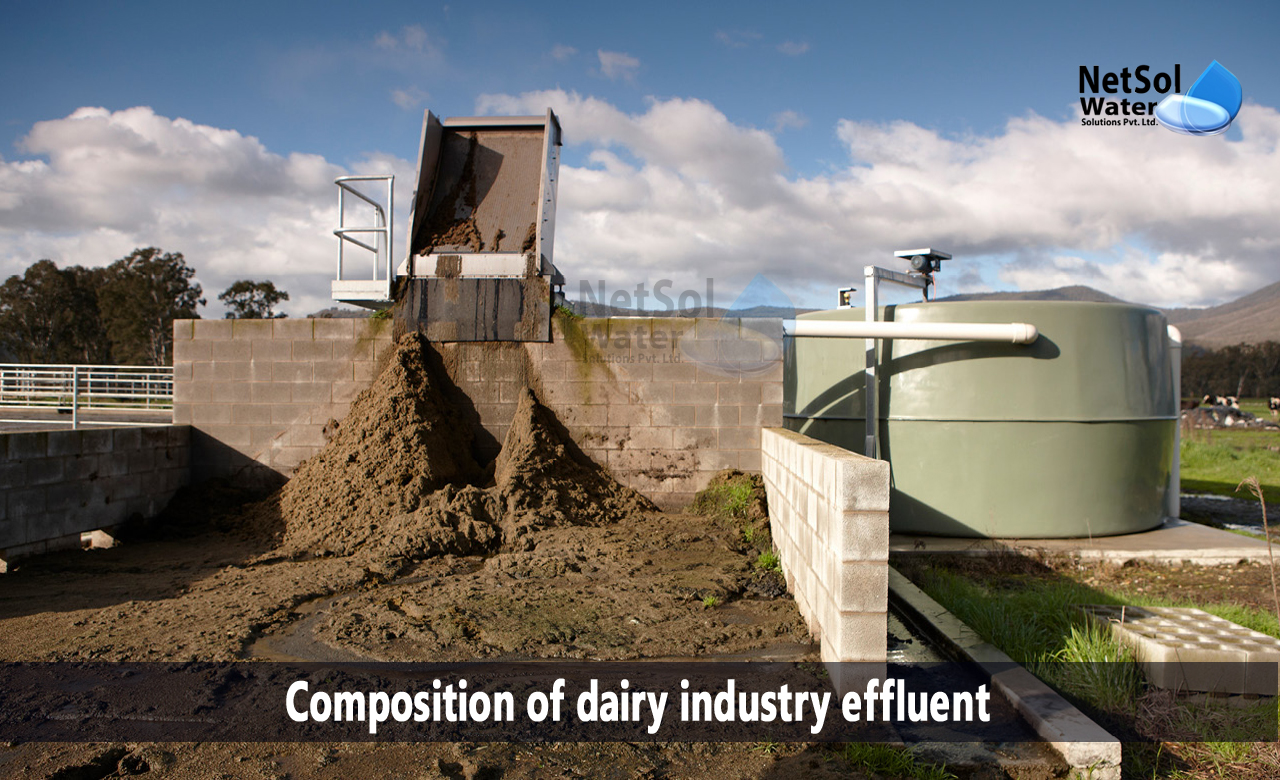The largest source of water pollution is the dairy sector, which generates 2.5 to 3 litres of wastewater for every liter of milk processed. In milk processing facilities, where it is utilized for a variety of purposes, including cleaning, washing, disinfecting, chilling, and heating, water is a precious resource. Leaks, can overflow, and the release of goods like whey are all causes of wastewater. It thus produces a large amount of BOD and COD.
What are the Composition of dairy industry effluent?
The generation of industrial effluent with a high organic load and a big volume from the dairy industry, makes it challenging to remove. Dairy industry often produces white or yellow effluent. It has a higher organic content than other food sector effluents, as well as higher quantities of proteins and carbs. Organic substances including lactose, whey proteins, minerals, and lipids give out unpleasant scents as they degrade, upsetting the stomach.
The effluents often have significant amounts of COD, BOD, and TSS. The properties of dairy effluent vary depending on the industrial scale, the kind of processing, the process parameters, the type of operation, the type of water discharged, and many other variables. Dairy effluent continues to be one of the major contributors to water pollution and one of the richest sources of nutrients, for bacteria, algae, and fungi due to the massive amount of organic load.
Characteristics of dairy industry effluent
|
Effluent water Parameter |
Septage, mg/L |
Sewage, mg/L |
Relative Strength Ratio (Septage : Sewage) |
|
Chemical Oxygen Demand |
32,000 |
500 |
65 : 1 |
|
Total Suspended Solids |
13,000 |
220 |
60 : 1 |
|
5 – day BOD |
6,500 |
220 |
30 : 1 |
|
Total Kjeldahl Nitrogen |
600 |
40 |
15 : 1 |
|
Ammonia Nitrogen |
100 |
25 |
4 : 1 |
|
Total Phosphorus |
210 |
8 |
25 : 1 |
|
Oil and Grease |
5,500 |
100 |
55 : 1 |
Let’s underst?and the treatment methods for dairy industry effluent-
Dairy factories in rural locations without enough farmland for land application, may be able to handle dairy waste more cheaply by using ponds or lagoons. Typically a shallow basin, a pond or lagoon is made for the treatment of dairy effluent, without the need for complicated machinery or controls.
The following pond types are used:
1- Aerobic Ponds: Aerobic ponds are normally between 0.5 and 2.0 meters deep, with the water's surface mechanically mixed and aerated to promote algae development and sunlight penetration. The bacteria involved in the biological breakdown of milk wastes produce waste products, which the algae use to make oxygen. BOD elimination can reach 85% with a 5-day aeration time at 20°C.
2- Anaerobic ponds: Anaerobic ponds are frequently used to stabilize settled solids or to pre-treat dairy wastes, which are heavy in protein and fat. An aerobic technique must be used to successfully reduce BOD in anaerobic effluent, allowing aerobic microorganisms to eat the leftover breakdown products. Anaerobic treatment ponds typically retain water for 20 to 50 days.
Conclusion
Dairy production uses a lot of water, making it one of the most polluting food businesses. India's dairy industry is anticipated to grow quickly as a result of the country's rising milk demand, with waste generation and associated environmental concerns taking on more significance.
Poorly treated wastewater with high levels of contaminants due to subpar design, operation, or treatment systems, poses significant environmental issues when discharged to the surface of land or water.
How can we assist?
By utilizing a wide variety of specialist water treatment and wastewater treatment technologies, the Netsol Water team has assisted in the resolution of hundreds of water-related issues. Together, we will develop a tailored water treatment solution that satisfies your particular needs, as well as an on-going service schedule to fully or partially maintain your system.
Netsol Water is Greater Noida-based leading water & wastewater treatment plant manufacturer. We are industry's most demanding company based on client review and work quality. We are known as best commercial RO plant manufacturers, industrial RO plant manufacturer, sewage treatment plant manufacturer, Water Softener Plant Manufacturers and effluent treatment plant manufacturers. Apart from this 24x7 customer support is our USP. Call on +91-9650608473, or write us at enquiry@netsolwater.com for any support, inquiry or product-purchase related query.



